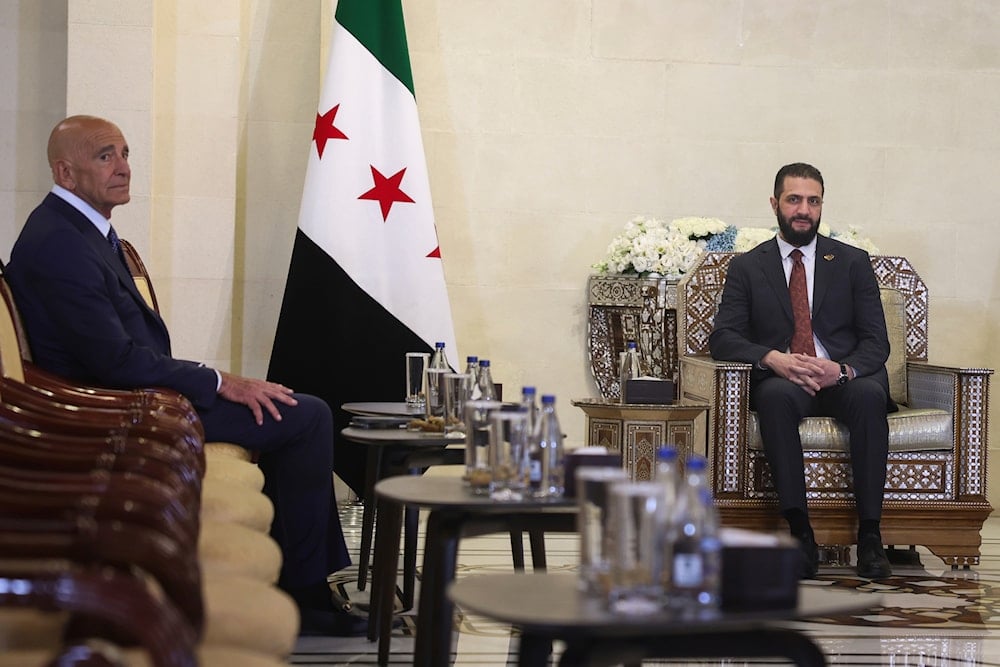Syria-'Israel' talks mark 'new phase' in region: Haaretz
Talks between Syria and the Israeli regime mark a turning point, with US-backed efforts focusing on Sweida, Druze autonomy, and border security.
-

Syria's interim president, Ahmad al-Sharaa, meets with US Ambassador to Turkey and Special Envoy to Syria Tom Barrack at the People's Palace in Damascus, Syria, Wednesday, July 9, 2025. (AP)
Israeli newspaper Haaretz described the talks between Israeli Minister of Strategic Affairs Ron Dermer and Syrian Foreign Minister Asaad al-Shibani as a "decisive test" for the course of relations between Damascus and Tel Aviv, noting that the recent meeting received unprecedented official coverage from the Syrian official news agency, SANA.
The newspaper also reported on the intense diplomatic activity in recent days concerning the situation in southern Syria, the latest of which was the meeting in Paris between Dermer and al-Shibani, which it described as a "decisive test" for the trajectory of relations between Damascus and Tel Aviv.
The report also indicated that the meeting between Dermer and al-Shibani was attended by US envoy Tom Barrack, who subsequently held a separate meeting with the spiritual leader of the Druze community in occupied Palestine, Sheikh Mowafaq Tarif, as part of broader US efforts to establish new security arrangements in southern Syria.
Dermer, al-Shibani already met in July
The newspaper further reported that a meeting between Dermer and al-Shibani had already taken place last month, brokered by Barrack to discuss security arrangements and Israeli military activities in Syria. Meanwhile, the most recent meeting two days ago received unprecedented official coverage in the form of a statement from the official Syrian news agency, SANA.
Haaretz reported that the SANA statement outlined how the discussions had addressed key issues, most notably "de-escalation, non-interference in Syria's internal affairs, the renewal of the 1974 Disengagement Agreement, and the supervision of the ceasefire in the Sweida region."
The Israeli newspaper added that the statement clarified that these meetings were part of "diplomatic efforts to enhance security and stability in Syria and to preserve its unity and territorial integrity."
Barring Hezbollah, Iran from Syria key term
In this context, the newspaper cited informed sources stating that a fundamental item on the table for discussion is preventing the deployment of Hezbollah, Iranian forces, or any other entity considered hostile to "Israel" in southern Syria.
The sources added that among the proposals being discussed is for the border area to be free of the Syrian army, and instead, security forces, which would not be supplied with heavy weapons, will be present, whose role is to simply maintain order.
Haaretz views these talks as an opportunity for the Syrian regime to establish a direct channel with the Israeli regime and strengthen its relationship with Washington, but also sees them as fraught with internal challenges, positing that any concessions made by the Assad regime could be interpreted by the public as an act of "betrayal" that would threaten its legitimacy.
According to Haaretz, associates close to Barrack stated that the United States will continue to support any effort that achieves lasting stability between "Israel" and its neighbors, a position that aligns with US President Donald Trump's vision for a "prosperous and stable" Middle East.
US, Druze leadership discuss autonomy, aid
The newspaper further reported that Sharaa is seeking to portray himself as the protector of the Druze against attacks by Bedouin tribes, while community leaders view the situation as a siege intended to punish them and suppress their protests against the regime, all amidst internal and external calls to explore a framework for autonomy in the province. Damascus considers this autonomy a threat to the country's unity that also raises concerns over similar demands from Kurds in northeastern Syria.
In a related development, Barrack and Sheikh Tarif discussed the establishment of a humanitarian crossing between Syria and "Israel" to facilitate the delivery of international aid to the Druze community in Sweida, a project that the newspaper reported Washington is monitoring closely.
These meetings highlight an intersection of Israeli and US security interests embodied in Syria, potentially creating a rare model for cooperation between adversaries; however, a failure to ease tensions could lead to a wider regional escalation, a scenario that underscores Washington's intended role in shaping a new order, even as Turkey pursues its own ambitions in Syria.
"Israel", whose occupation forces currently control part of the border area, is unwilling to assume responsibility for the local population and seeks to transfer this responsibility to the Syrian regime.
A humanitarian crossing between 'Israel' and Syria
The core of the meeting between Barrack and Tarif was the ongoing tensions in Syria's Sweida province. According to informed sources, a primary issue they discussed was the creation of a humanitarian crossing between Syria and "Israel" to facilitate the delivery of international aid to the local Druze community.
A preliminary plan for this project was drafted, and the discussions centered on how to implement it under United States supervision. If this initiative is ultimately realized, it would serve as a significant test of Syria's capacity for operational cooperation with "Israel".
Associates close to Barrack stated that the US will continue to support any initiative that leads to lasting stability and peace between "Israel" and its neighbors. They added that this stance is consistent with former President Donald Trump's vision for a prosperous Middle East, in which Syria would be stable, secure, and at peace with itself and its neighbors, including "Israel".
While the Sharaa regime claims it is seeking to protect the Druze in Sweida from attacks by Bedouin tribes, community leaders assert that the situation is actually a blockade intended to punish the Druze and suppress their protests against the government.
Meanwhile, Druze leadership expects both "Israel" and the United States to support their community, believing that these powers could leverage Sharaa's desire for international legitimacy to pressure him into settling the future of Sweida.

 6 Min Read
6 Min Read









